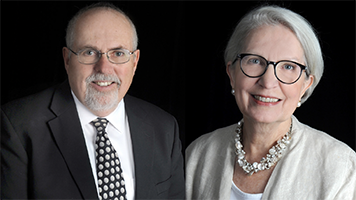 Rick and Sandra Carringer, '77 Plant Pathology and '76 Agronomy, respectively
Rick and Sandra Carringer, '77 Plant Pathology and '76 Agronomy, respectively
A native of Muhlenberg County, Sandra Carringer graduated in 1976 with a bachelor’s degree in agronomy. Richard Carringer graduated in 1977 with a doctoral degree in plant physiology.
After working for agricultural industries and private research groups for several years, they formed The Carringers Inc., which provides support for field research trials used for global regulatory submissions in support of pesticide products. They established a second company, Carringer Ag Research Service Inc. about a decade later.
As an independent contract research organization, the Carringers have consistently delivered excellent, high-quality field studies for many years. Their quality, reliability and ability to overcome challenges is a hallmark of their work. They are pioneers in conducting regulated, genetically modified field trials.
Their contribution to the agriculture industry and agricultural economy reflects significant advancement in ag biotechnology that has helped combat the challenges of food security and environmental sustainability. Their work has touched most agriculture biotechnology products grown on 190 million hectares worldwide. The safety data generated under the Carringers’ leadership helps to ensure public and regulatory agencies that food produced by genetically modified technology is safe for human and animal consumption.
They are involved in a large, multi-partner philanthropic project funded by the Bill and Melinda Gates Foundation involving new seed production technologies to improve maize production in Africa. The Carringers established a graduate student award in CAFE, and they have been mentors and trainers throughout their careers. They reside in Apex, North Carolina.
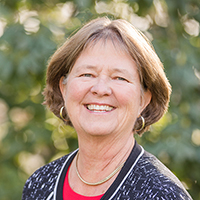 Barbara Glenn, '76, '80 Animal Science
Barbara Glenn, '76, '80 Animal Science
Barbara Glenn has spent her entire career serving the agriculture community through her research, advocacy, leadership and volunteer work. Her passion for agriculture began at an early age participating in 4-H. She received a bachelor’s degree in animal science in 1976 and a doctorate in ruminant nutrition in 1980 from UK.
Glenn began her career at the University of Maryland before joining the U.S. Department of Agriculture Agricultural Research Service as a research dairy scientist, a position she held for 17 years. After a successful USDA career, she shifted her career focus to government relations, working for several organizations on the national level.
From 2014 until her retirement in 2021, Glenn was chief executive officer of the National Association of State Departments of Agriculture. She championed the work of state departments of agriculture. She was a unifying voice, successfully interfacing between state and federal policymakers, navigating a challenging regulatory landscape, strengthening national agriculture policy and setting productive trade policy for agriculture through the passage of the United States-Mexico-Canada Agreement.
Glenn was the first woman president of the American Society of Animal Science. She served on the USDA Agricultural Policy Advisory Committee and as a U.S. Office of Trade representative through multiple presidential administrations. She was chair of the Coalition on Funding Agricultural Research Missions and is a fellow with the American Association for the Advancement of Science. Glenn also served as a member of the Board on Agriculture and Natural Resources of the National Academy of Sciences, and the Food and Drug Administration’s Veterinary Medicine Advisory Committee.
Additionally, she volunteers for the Maryland Agricultural Education Foundation Board, Howard County Maryland 4-H Foundation Board and Maryland Farm Bureau Agriculture Education and Extension Committee. Glenn lives in Highland, Maryland.
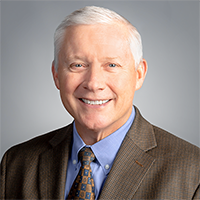 Drew Graham, '83, '85 Ag Education
Drew Graham, '83, '85 Ag Education
Drew Graham received his bachelor’s degree in agriculture in 1983 and master’s in education in 1985 from UK. His career started in the livestock feed business, and he continued in that role while also moving into state and local government, serving as Kentucky representative for the 73rd District. He became Clark County judge-executive and, later, director of legislative affairs for former Gov. Ernie Fletcher.
During his political career, Graham was recognized for a steady hand, creativity and bipartisanship. As county judge-executive, he proposed and secured passage of a special taxing district to help support the county’s Cooperative Extension Service. While state representative, he chaired the House Agriculture and Small Business Committee.
Drew joined the UK College of Agriculture, Food and Environment in 2004 and was eventually promoted to senior assistant dean and director of Government Relations and External Affairs. During this time, he maintained excellent relations with state and federal officials and oversaw the extensive renovation of the UK Veterinary Diagnostic Laboratory and the UK Grain and Forage Center of Excellence. He played a pivotal role in the transformation of the Kentucky Cooperative Extension Service.
In 2018, Graham was named executive vice president of the Kentucky Farm Bureau Federation, a position he holds today. He continues to support the college as a member of the state and national councils for the advancement of extension, research and teaching. Graham owns and operates a family farm in Winchester.
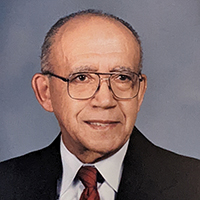 Percy R. Luney, '53 Ag Economics
Percy R. Luney, '53 Ag Economics
The late Percy R. Luney Sr., a native of Breckinridge County, was a war hero, a public servant who conducted pioneering work analyzing highly classified information and a champion for civil rights.
He served for four years as part of the famed 92nd “Buffalo” Infantry Division in World War II and was awarded three Bronze Stars. In 1953, he completed a master’s degree in agricultural economics from UK, becoming the first African American to receive a degree from the UK College of Agriculture, Food and Environment.
He went on to do post-graduate studies at the University of Chicago before taking a post as an intelligence officer with the Central Intelligence Agency in Washington, D.C. Luney’s work focused on using high-altitude photography and satellite-based remote sensing to study agricultural production in the Soviet Union. After 11 years with the CIA, he moved to the U.S. Department of Agriculture Economic Research Service, specializing in natural resource economics.
In 1969, he became deputy chief for the evaluation unit in the USDA Office of the Secretary of Agriculture for Civil Rights. He developed and evaluated the impact of USDA programs on minority participants. He established base data to measure USDA programs’ progress toward equal access and opportunity.
His work in support of civil rights at USDA continued as chief of the Program, Planning and Evaluation Division in the Office of Equal Opportunity and as chief of the Civil Rights Division. He retired from USDA in 1982 and moved from Washington, D.C., to Durham, North Carolina, where he became active in the Duke University Institute for Learning in Retirement and was a deacon at churches in Washington, D.C., and in Durham. Luney later earned his real estate broker’s license and took the H&R Block tax preparer course. While he never worked in either of these fields, he used the skills he learned to provide free advice to friends, senior citizens and low-income families. Luney died in 2004.
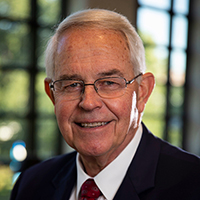 Mike Richey, '74 Ag Science, '76 Ag Education
Mike Richey, '74 Ag Science, '76 Ag Education
A native of Muhlenberg County, Michael Richey received his bachelor’s degree in agricultural education from UK in 1974. He moved from student to staff, beginning a career expanding and supporting alumni and philanthropic efforts – first at the college level, then at the university level and beyond. He also earned a master’s degree in agricultural education from UK in 1979.
Early in his career, Richey was driving throughout Kentucky recruiting students to attend CAFE, and he’s never stopped, even though his roles have changed. During his 24 years in CAFE, he led the first college development program at UK, created the first scholarship banquet, the first college donor recognition society, and began a gift and estate planning program that became a model for others.
UK then named him vice president for Philanthropy and Alumni Engagement, where he managed UK’s philanthropy and alumni programs to national acclaim until retiring in January.
During his tenure, he provided leadership, management and strategies that led to the successful completion of UK’s first-ever capital campaign which exceeded its goal of $1 billion. He completed strategic planning, staffing and the launch of the university’s current comprehensive fundraising campaign with a goal of $2.1 billion.
Richey has served in leadership positions at national and international levels, including president of the National Agriculture Alumni Development Association, Kentucky FFA Foundation and The Gideons International. He has received numerous state and national recognitions for his professional and nonprofit work – including the UK Sullivan Medallion, National Association of State Universities and Land-Grant Colleges special service citation, and the National Agriculture Alumni and Development Association Distinguished Service Award. Richey lives in Lawrenceburg.
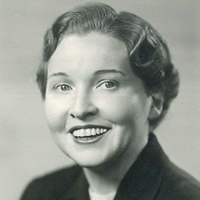 Jessie Wilson Ringo, '37 Home Economics
Jessie Wilson Ringo, '37 Home Economics
The late Jessie Ringo had a 29-year career in home economics as a Cooperative Extension agent and college instructor. Ringo received a bachelor’s degree in 1937 and master’s degree in 1954 in home economics. She was tenacious in her desire to achieve her degree, spending one semester at UK in 1931 before having to leave due to the Great Depression. During that hiatus, she earned a teaching certificate and taught until earning enough to return to UK and complete her undergraduate work.
In 1937, she began her Extension career as a home demonstration agent, but her love of Extension began through 4-H as a child in Daviess County. Her work in Hickman County included assisting with the 1940 Government Surplus Cotton Mattress Program. Using surplus cotton, husbands and wives worked as teams to make mattresses using skills they learned from extension agents. For most of the families that participated, it was the first mattress they owned.
In 1947, Ringo, a widow with three small children, moved to Lexington to obtain a master’s degree. She then taught for one year at Murray State before returning to UK’s home economics department to operate the nursery school training program. In 1967, she returned to her Extension roots as Cooperative Extension agent in Shelby County for three years, before being tapped to serve as acting chair of the UK Department of Management and Family Economics.
Over her teaching career, she wrote the course of study for 19 classes. Ringo retired in 1977 and died in 2002.
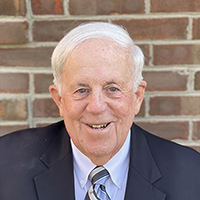 William "Bill" Smith, '70 Ag Economics
William "Bill" Smith, '70 Ag Economics
After graduating in 1970 with a bachelor’s degree in agricultural economics, William “Bill” Smith held positions in the agriculture industry before dedicating his career to conducting research trials and seed production for the development of triticale, a small grain.
For more than 37 years, he has played a key role in research and market development to improve triticale. His persistence and expertise helped establish triticale as a viable crop with over 1 million acres annually planted. He has actively worked to develop varieties that require less irrigation, lower fertilizer inputs, improved yield and pest resistance.
Smith annually logs thousands of miles planting on-farm variety trials while working with the U.S. dairy industry to promote improved varieties for grazing and silage. He has worked with several land-grant universities on feed trials for dairy, beef, swine and poultry. Smith has also worked with international plant breeders to promote triticale varieties for livestock forage systems in Australia, Argentina, South Africa and Brazil.
Smith has dedicated his time and talent to his alma mater holding many roles with the CAFE Alumni Association, including president, as well as serving on the UK Alumni Association board of directors.
He served his community through his support of and service to Boone County Extension, serving for 26 years as chairman of the board, and was instrumental in constructing and overseeing three expansions to their campus. Additionally, Smith was involved with relocating the Boone County Farmers Market to its permanent location and helped create the Boone County Arboretum.
Nationally, he has represented the college on the Council of Agriculture, Research Extension and Teaching in many capacities including southern region past chairman and CARET liaison on the Board of Agriculture for federal budgets.
Smith is currently the Eastern U.S. research manager for Northern AgriBrand LLC and lives in Union.